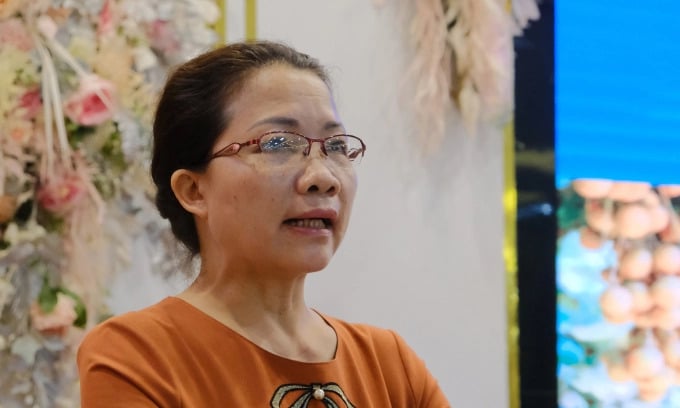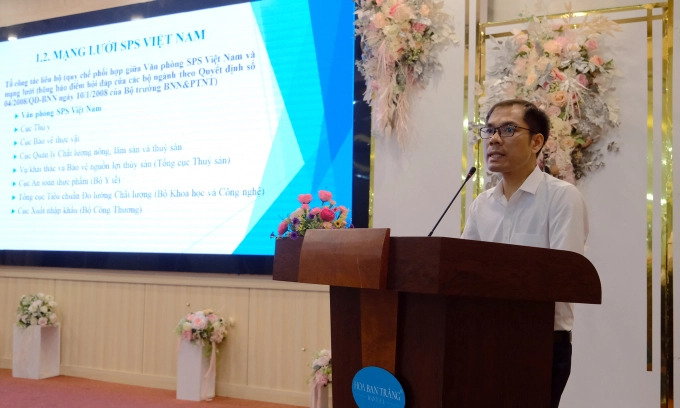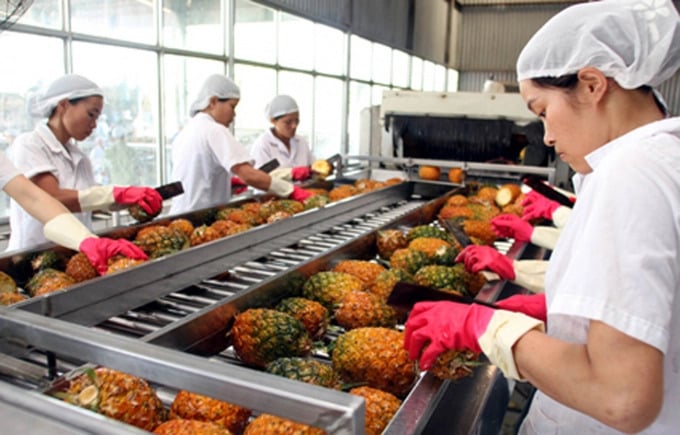June 21, 2025 | 02:41 GMT +7
June 21, 2025 | 02:41 GMT +7
Hotline: 0913.378.918
June 21, 2025 | 02:41 GMT +7
Hotline: 0913.378.918
Cam Thi Phong, Deputy Director of Son La Province’s Agriculture and Rural Development Department made the statement at a conference on disseminating regulations and implementing SPS commitments to new generation free trade agreements.
The conference was co-organised by the Vietnam Sanitary and Phytosanitary Notification Authority and Enquiry Point (Vietnam SPS Office), the agricultural department and the provincial Department of Industry and Trade.

Cam Thi Phong, Deputy Director of Son La Province’s Agriculture and Rural Development Department. Photo: Bao Thang.
“Through such conferences, we know exactly where we stand, and how we need to change, from the way we use fertilizers and pesticides as well as the record to ensure traceability origin at the request of the importing country,” she said.
Dao Van Cuong, an expert from the office said SPS commitments is developed, announced by the member countries of the commitments and it is mandatory for all member countries.

Dao Van Cuong, an expert from the Vietnam Sanitary and Phytosanitary Notification Authority and Enquiry Point (Vietnam SPS Office). Photo: Bao Thang.
At the same time, the importing party will ensure that import requirements are fair, non-discriminatory and transparently, he said.Import procedures must guarantee that the negative effects on trade are minimized, he said.
For the European Union (EU) market alone, the EU-Vietnam Free Trade Agreement (EVFTA) states that exported goods must be allowed to be imported by the EU and they must be granted appropriate certificates, he said. Besides, the competent authorities of Vietnam need to certify and ensure that the goods meet the conditions and requirements of the EU, he said.
Cuong said a number of Vietnamese products especially benefit from the EVFTA. For example, the EU commits to zero per cent tax for a quota of 80,000 tonnes of rice per year for milled rice and fragrant rice. There is no quota for broken rice and tax will be eliminated in five years.
Some other products are granted quotas by the EU each year, including 500 tonnes of poultry eggs, 400 tonnes of garlic, 5,000 tonnes of corn, 30,000 tonnes of tapioca, 11,500 tonnes of tuna and 20,000 tonnes of sugar, he said.Benefiting from taxes in new generation FTAs, but Vietnamese agricultural products also face challenges with technical barriers, he added.
The Vietnam SPS Office said that the number of warnings from WTO members to Vietnam increased by 12 per cent compared with the same period last year. For the EU market, the most warning is about chemical residues (47.5 per cent).
Nguyen Dac Binh Minh, Director of the Institute of Regional Research and Development under the Ministry of Science and Technology said the issue of product traceability is very imperative.Minh said the issue of traceability is mentioned as a mandatory requirement of many multilateral FTAs.
Since January 1, 2005, the EU has made traceability a mandatory requirement for EU member states. The Chinese market requires that since 2019, nine officially imported fruits from Vietnam must be traceable, including lychee, longan, watermelon, dragon fruit, rambutan, banana, jackfruit, mango and mangosteen.

Son La has many agricultural products with the highest output in the country.
Nguyen Van Phuong, Vice Chairman of the People's Committee of Song Ma District, Son La Province said that the district continues to identify the main export market as China, besides bringing agricultural products to gradually approach the EU market.
We have worked with a number of purchasing businesses to ensure the sanitary and phytosanitary requirements of the import market, he said.Three factors that the district always remind local farmers are the code of the packing facility, the code of the growing area and the traceability stamp, he said.
In addition, local farmers were told to follow the strict implementation of standards such as VietGAP as well as creating conditions to bring agricultural products to Eurofins stations to test for chemical residue levels before exporting to the EU market, he said.
Vu Dang Ke, Director of Muong Bu Agricultural Cooperative in Muong La District said that he had received a lot of useful information at the conference. He submits the managerial agencies to create more favourable conditions in bringing Vietnamese agricultural products abroad.
Duong Van Dat, Director of Dat Thuy One Member Limited Liability Company, in Co Noi Commune, Mai Son District said that it should issue policies to develop and encourage processing facilities. He wishes to contribute to building the brand of Vietnamese agricultural products in the international arena, avoiding the situation that other countries import Vietnamese agricultural products in raw form then they deeply process and re-export to third countries./.
Translated by Thu Hang
/2025/06/17/3942-2-143243_548.jpg)
(VAN) Recently, in Sweden, the Secretary of the Binh Dinh Provincial Party Committee presented the Investment Registration Certificate for the 'Polyester Fabric Recycling Complex' project to SYRE Impact-AB Company.
/2025/06/12/3721-2-202745_83.jpg)
(VAN) TH made an impression at Seoul Food 2025 with its line of natural beverages, paving the way for Vietnamese food products to enter the South Korean market.

(VAN) Soc Trang's success in rice exports stems from a strategy of developing fragrant and specialty rice cultivation areas and standardizing production toward low-emission practices.
/2025/06/11/1311-5-120811_839.jpg)
(VAN) The pig farming industry is facing the challenge of comprehensive restructuring to meet requirements for quality, safety, traceability, and market expansion both domestically and for export.

(VAN) Vietnam considers participating in ALGROALBA in order to expand agricultural production, coordinate the assessment and effective exploitation potential land.
/2025/06/05/5314-1-184727_407.jpg)
(VAN) From seemingly worthless fish scales and skin, enzymes and lactic ferments can transform by-products into peptides, opening a sustainable, effective business direction and elevating Vietnamese seafood.

(VAN) TTC AgriS and IFC signed a strategic partnership to develop a sustainable agricultural value chain, aiming to achieve the Net Zero target by 2035.